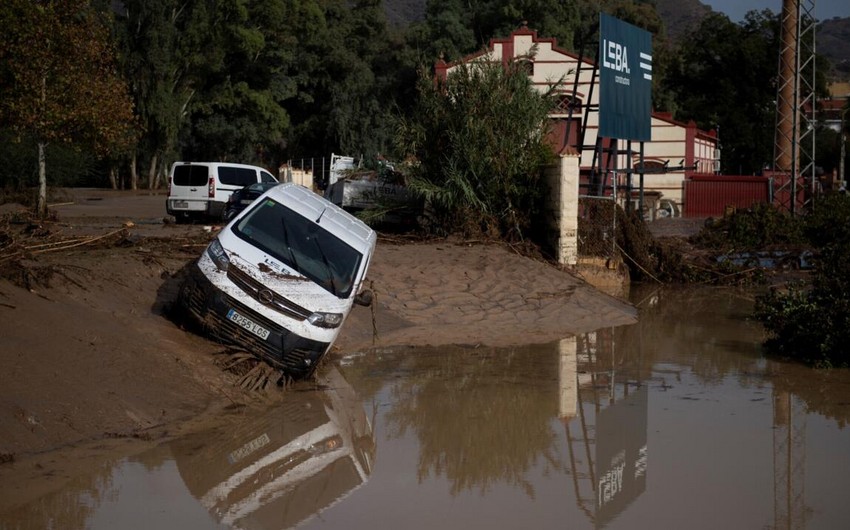At least 63 people are feared to have died after torrential rains hit southern and eastern Spain on Tuesday, bringing flash floods that raged through towns and cut off roads and railway lines.
Report informs via The Guardian that as the search continued for the missing, people were urged to stay off the roads and away from swollen rivers amid warnings that the severe weather was not over and that the number of fatalities could still rise.
The Valencian government’s emergency coordination centre said its multiple victims protocol had been activated, adding that the latest number of known fatalities in the region was 62.
The central government delegation in the central Castilla-La Mancha region later said an 88-year-old woman was found dead in the city of Cuenca.
Speaking on Wednesday morning, Valencia’s regional president said it was still too early to provide a comprehensive death toll. “These are very difficult hours for relatives and for the disappeared,” said Carlos Mazón. “We will confirm the number of victims over the coming hours but right now it’s impossible to offer a precise figure. We’re in shock.”
The regional government also urged people to stay off flooded or cut-off roads, saying the emergency services needed access and that more flood water could accumulate.
More than 1,000 soldiers from Spain’s emergency response units were deployed to the devastated areas, and the ministry of defence offered mobile morgues if needed.
Images on Spanish TV showed turbulent, muddy water surging through the town of Letur in the eastern province of Albacete on Tuesday, dragging cars through its streets.
“Yesterday was the worst day of my life,” Ricardo Gabaldón, the mayor of Utiel, a town in Valencia, told the national broadcaster RTVE. He said several people were still missing in his town. “We were trapped like rats. Cars and rubbish containers were flowing down the streets. The water was rising to 3 metres,” he said.
One elderly couple was rescued from the upper story of their house by a military unit using a bulldozer, with three soldiers accompanying them in the huge shovel.
Television reports ran videos shot by panicked residents showing waters flooding into the ground floors of flats, streams overflowing their banks and at least one bridge giving way.
Spain has experienced similar autumn storms in recent years, but nothing has compared to the devastation over the past two days.
A high-speed train with nearly 300 people on board derailed near Málaga, although rail authorities said no one was hurt. The high-speed rail service between Valencia city and Madrid was interrupted, as were several commuter lines.
Spain’s central government has set up a crisis committee to help coordinate rescue efforts.
In a televised statement on Wednesday morning, Spain’s prime minister, Pedro Sánchez, called for unity, solidarity and vigilance. “We mustn’t let our guard down because the weather front is still wreaking havoc and we can’t say that this devastating episode is over,” he said.
“There are still weather warnings in Andalucía, Valencia, Aragón, Castilla y León, in Cataluña, in Extremadura, in Navarra, in La Rioja and in Ceuta. That’s why I’m asking people in those areas to take special care: to stay off the roads; to avoid travelling close to ravines, riverbanks and riverbeds, and to heed the advice of the emergency services and of the police. No one should be putting their life at risk.”
The prime minister said Spain had had more than its fair share of natural and health emergencies in recent years, mentioning the Covid pandemic, Storm Filomena in January 2021, and the volcanic eruptions in the Canary islands that year. But, he said, such adversity brought out the best in the country.
“We’re going to lend a hand and help those who can’t get into their homes or who are looking for relatives or friends or loved ones,” he said. “But most of all right now, we’re going to stand with those who are suffering the loss of their loved ones.”
Spain’s congress held a minute’s silence to commemorate the dead, while King Felipe also offered his support to the families of the dead and missing, saying he was “heartbroken” by the news of the flooding and its fatalities. “I’m sending strength, encouragement and all the necessary support to all those affected,” he said. “We recognise and appreciate all the local and regional authorities and the emergency and security services as they continue with the titanic task they have been carrying out since the very first moment.”
By 10am on Wednesday, the rains in Valencia had subsided. But Spain’s national weather service forecast more storms through Thursday, with the rains moving to the north-east of the Iberian peninsula.
The intense rain has been attributed to a phenomenon known as the gota fría, or “cold drop”, which occurs when cold air moves over the warm waters of the Mediterranean. This creates atmospheric instability, causing warm, saturated air to rise rapidly, leading to the formation of towering cumulonimbus clouds in a matter of hours and dumping heavy rain across eastern parts of Spain.
Scientists say extreme weather such as heatwaves and storms is becoming more intense because of the climate crisis.


 https://static.report.az/photo/845831d4-ee5b-3282-9ce1-93c39fa6acfd.jpg
https://static.report.az/photo/845831d4-ee5b-3282-9ce1-93c39fa6acfd.jpg

